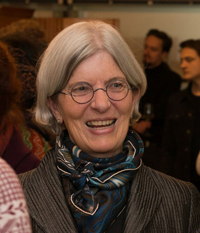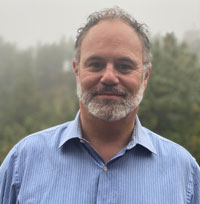Letter from Editor
Dear Colleagues,
“Even though far away here in NZ, we are no strangers to the ‘furies’ of mother nature in these last few years,” wrote Rajan Gupta (New Zealand) in an IARPP Collective post last month as the Southern California wildfires raged.
I imagine Rajan was referencing the Black Summer season that Australia suffered five years ago. You may recall our Australian colleagues’ horrified reports, as fires destroyed 19.5 million hectares (over 75,000 square miles) of vegetation and over 3,000 homes (internationalaffairs.org.au). Recent years have seen similar catastrophic fires in Canada, Portugal, Spain, Chile, Brazil, and Greece. This past summer wildfires erupted even inside an urban park in Brooklyn, NY. And of course flooding and other natural calamities have recently increased in number and intensity as well.
The California wildfires have consumed about 75 square miles – a fraction of the scope of Australia’s fires but occurring in much more densely populated areas, and over 16,000 buildings have been lost (Los Angeles Times). We know of several IARPP members who have lost their homes. They and their families are in our thoughts.
Phil Ringstrom (USA) ’s Los Angeles-area home and office were in a “pre-evacuation zone” a few weeks ago – and, thankfully, remained outside the reach of the fires. Phil recently shared the following piece of his experience sitting with patients directly affected by the devastation:
Today, listening to the stories of two men who skipped the evacuation order and battled the fires with their garden hoses, who saved their family homes despite upon reflection, some might judge as foolishly risking their lives. Who are now ravaged emotionally and psychologically on multiple levels. Both required such a granular level of engagement, of listening, of witnessing, to help them sort out and at least better connect to themselves. It entirely drained me. I am not complaining. It is the privilege of our work.
Mostly trying to connect with how alone they feel in their stories. To connect in the paradox, that there is little that I can do right now to change their sense of being, of being all alone. Mostly, left to just lean into it, as deeply as I could. To try to be with them and to trust that this experience will not be forgotten. And that this fact will perhaps resurrect a portal of reconnection.
It did seem that it did make them feel a smidge more sane, and me as well.
The losses to infrastructure, homes, businesses, and community feel incalculable, in addition to the loss of at least two dozen lives. The fires were not fully contained until the last day of January, after 24 days of firefighting efforts (Los Angeles Times).

Donna Orange
Another painful loss that warrants commemoration is the November death of noted analyst and author Donna Orange. Highly regarded for her clinical work, her philosophical inquiries and her theoretical contributions, Donna brought her keen intellect and capacious heart to a wide range of concerns, including the plight of the suffering stranger, the clinician’s ethical obligations … and the perils of climate change. Her penultimate book, published in 2017, was Climate Crisis, Psychoanalysis, and Radical Ethics.
In noting Donna’s passing, our President, Sandra Toribio Caballero (Spain), remarked at the time, “We will always cherish her extraordinary contribution to our field and her human quality.”
I will quote in full an appreciation from Sandra Buechler (USA):
Donna was my dear friend. She was also someone I deeply admired. She expressed and embodied her values. Donna’s great heart went out to the struggling clinician, people who were abused, those who suffered poverty, and our planet, in her book about climate change. She was a clinician’s clinician, ready to offer advice/help when needed. Her personal determination, her sheer grit, conquered bikeways and complicated intellectual arenas. Her loyalty to friends was fierce. Her intellect matched her emotional strength. There was always adventure wherever she was, whether it was trying a new restaurant or reading a new author. You could always count on her compassion. For me it is unthinkable that she is gone, and I believe it will always be unthinkable.
* * *
In happier news, I am pleased to share with you that Adriana Cuenca Carrara (Mexico/USA) and Berta Loret de Mola (Mexico) are now IARPP Board Members. Many of you will remember them both from the Mérida Conference for which they served as gracious Conference Co-Chairs. Welcome aboard, Adriana and Berta.
Registration has just opened for the 2025 IARPP Conference, “The Paradox of Freedom in Relational Psychoanalysis: Democracy and Tyranny In and Out of Therapy,” to be held in Athens, Greece from June 19 – 22, 2025. Click here for all the details.
This month’s Bookshelf issue practically groans under the weight of its contents. No fewer than eight new books from our members are announced herein, in addition to a variety of chapter, paper, and presentation announcements.
Further, I am pleased to re-introduce to the Bookshelf a feature long absent. Starting with this issue, Berta Loret de Mola (Mexico) will interview select IARPP members in connection with the publication of their new books. In this issue, Berta inaugurates the newsletter feature with a wonderful discussion conducted with Joyce Slochower (USA) on themes animating her most recent book, Psychoanalysis and the Unspoken (Routledge, 2024). I imagine you will appreciate reading their conversation as much as I have.
And so, without further ado, here is the overview of this issue’s contents:
In Erotic Transferences: A Contemporary Introduction, Andrea Celenza (USA) essays a key yet often vexing aspect of psychoanalytic process. Noting our literature’s tendency to desexualize psychoanalytic theorizing, Celenza explores the topic comprehensively, limning the interplay of power and gender throughout. Glen O. Gabbard (USA) writes, “In this outstanding tour de force, Celenza brings [erotic transferences] out of the darkness and into the daylight.”
Peter Shabad (USA) explores helping patients overcome feelings of shame through self-acceptance, freeing them to regain their innate passion and grow, in Passion, Shame, and the Freedom to Become: Seizing the Vital Moment in Psychoanalysis. Shabad sees self-shaming and passivity as intertwined with the fatalism of self-pity, envy, resentment and regret for not “seizing the vital moments” in life. Christopher Bollas comments, “Reading Shabad’s book, I was reminded of the early psychoanalytic writers whose personalities shone through their prose.”
Roger Frie (Canada) ’s Edge of Catastrophe: Erich Fromm, Fascism and the Holocaust shows how the traumas and tragedies in Fromm’s family shaped his public stance against fascism. One of the twentieth century’s best known public intellectuals, Fromm may be one of its least understood analysts. “Interweaving psychoanalysis, history, and social critique, this book explains the dangers of fascism and issues an urgent call for these times,” Sue Grand (USA) observes.
In Intimacy in Alienation: A Psychoanalytic Study of Hindu-Muslim Relationships, Ashis Roy (India) explores the delicate relationship between the history of the two communities and that of the intimate Hindu-Muslim couple. Roy notes that exploring the psychological interiority of the couple promotes rethinking social and cultural phenomena of ‘otherness,’ ‘identity,’ and desire. As Neil Altman (USA) observes, “At this time of confusion and conflict around identity, Roy takes the conversation to the intimate level of marriage.”
Jade McGleughlin (USA) upends how we tell psychoanalytic stories in Clinical Storytelling, Art and the Problems of Being: The Analyst’s Necessary Vertigo. This series of overlapping clinical essays – sometimes highly personal, sometimes bristling with theory, sometimes employing experimental writing – trace the evolution of her ideas on engaging patients when verbal representation fails. Ken Corbett (USA) writes, “McGleughlin has produced a rare gem, an experimental psychoanalytic book, and illuminated the conventions that limit psychoanalytic practice.”
Joan Peters (USA), a professor of English, shares her experiences as a patient in psychoanalysis at two different points in her life in Untangling: A Memoir of Psychoanalysis. Written with candor and lucidity, Peters’ memoir offers the rare opportunity to encounter in depth a patient’s perspective and reflections on psychoanalytic treatment. “Untangling is a poignant reflection on love, dread, and the analytic process,” writes Galit Atlas (USA).
Shalini Masih (United Kingdom) brings a psychoanalytic perspective to states of spirit possession and exorcism in Psychoanalytic Conversations with States of Spirit Possession: Beauty in Brokenness. Extending psychoanalysis into spaces of traditional healing, Masih conducts culturally sensitive psychoanalytic conversations with participants who have felt haunted and possessed by ghosts. Michael Eigen (USA) writes, “This is a beautiful book, and the beauty spans many dimensions in depth and breadth.”
Daniel Shaw (USA) ’s Traumatic Narcissism: Relational Systems of Subjugation returns in Routledge’s Classic Edition. Shaw contributes a new introduction offering additional insights from his extensive work with victims of narcissistic systems, elaborating on the traumatizing narcissist’s “delusion of omnipotence.” The late Donna Orange commented approvingly, “This book belongs on my shelf between Leonard Shengold’s Soul Murder and Bernard Brandchaft’s pathological accommodation work.”
Brent Willock (Canada) published a paper that complements and challenges current comprehension of dreams within dreams. Jonathan Lebolt (USA) led a workshop on intersubjective/relational approaches to clinical work with LGBTQ+ patients. Ruth Lijtmaer (USA) presented on a classical ballet’s homage to Ukraine that expresses the loss, trauma and helplessness of war. Haim Weinberg (USA) published a chapter and an article on aspects of group work: diversity dynamics and the dilemma of forced termination of a group member.
* * *
If you would like the next IARPP Bookshelf to include news of your recent publications and/or presentations, please send the following materials to me at mattaibel@gmail.com by Sunday, May 25, 2025:
- Title of your recent or upcoming publication(s)/presentation(s) (We do not include announcements of IARPP Conference presentations.)
- An abstract or brief description of the content (around 150 words)
- Link to a publisher, if applicable, so that members might access or purchase a copy
- Book cover photo or artwork, if applicable
- Digital photograph of yourself (jpeg format)
- Professional contact information as you would like it to appear publicly (city/town in which you practice or work and your email address)
- Book authors, please provide a brief bio (75-90 words)
- Presenters, please spell out organizational acronyms and include the location, if in-person
Best wishes,
Matt Aibel, LCSW
IARPP Bookshelf Editor

Matt Aibel, LCSW
New York, NY, USA
Email Matt Aibel

